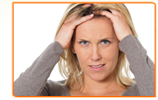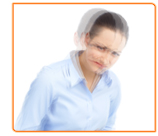Menopausal Night Sweats: How Black Cohosh Can Help
 It's 3 a.m., and you're soaked in sweat. Your heart is racing. You can't catch your breath. You feel as though you are engulfed in flames, and then you're suddenly chilled to the bone. Don't worry, this isn't life threatening. You're simply experiencing a night sweat, one of the most common -and unpleasant- symptoms of menopause.
It's 3 a.m., and you're soaked in sweat. Your heart is racing. You can't catch your breath. You feel as though you are engulfed in flames, and then you're suddenly chilled to the bone. Don't worry, this isn't life threatening. You're simply experiencing a night sweat, one of the most common -and unpleasant- symptoms of menopause.
If this menopausal symptom is keeping you up at night, you'll likely be looking for relief. One herbal remedy, black cohosh, has been known to improve sleep and relieve night sweats, but it does come with its side effects. Keep reading to learn more about black cohosh and how it can help you find relief from this much-reviled menopausal symptom.
What is Black Cohosh?
A native to North America, black cohosh has been used for centuries for the treatment of women's health issues, particularly in the inducement of labor. Today, the supplement is known for its effectiveness in treating the symptoms of menopause, and it can be found in its capsule form in the supplement aisles of most grocery stores.
How Does Black Cohosh Work?
Black cohosh is one of a group of plants known as phytoestrogenic herbs. These plants contain compounds that are thought to mimic estrogen in the body. For women going through menopause, phytoestrogens are thought to replace declining estrogen levels, relieving symptoms like hot flashes, loss of libido, vaginal dryness and night sweats. Though further research is needed into the effectiveness of phytoestrogens, many menopausal women have reported positive results, particularly with black cohosh.
Sounds Good, But What Are the Side Effects?
 Unfortunately, women have reported some unpleasant side effects while taking black cohosh. Dizziness, headaches and nausea have resulted from large doses. More serious, some studies have linked black cohosh use to an increased risk of breast cancer. Also, because of its use in the inducement of labor, it is very important to speak with a doctor before taking the supplement during pregnancy.
Unfortunately, women have reported some unpleasant side effects while taking black cohosh. Dizziness, headaches and nausea have resulted from large doses. More serious, some studies have linked black cohosh use to an increased risk of breast cancer. Also, because of its use in the inducement of labor, it is very important to speak with a doctor before taking the supplement during pregnancy.
Making a Decision
Is black cohosh right for you? That depends, of course, on you. Sometimes, simply changing your lifestyle by eating right and exercising more can give you the relief you need from night sweats and other menopausal symptoms. If these don't do the trick, herbal supplements like black cohosh can be a good alternative.
Click the following link to learn more about black cohosh.



























